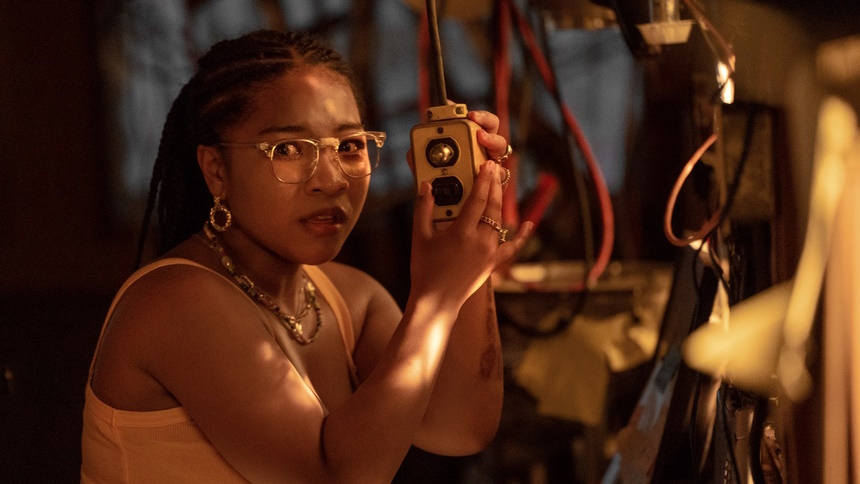SXSW 2023 Review: THE ANGRY BLACK GIRL AND HER MONSTER, A Different Kind Of Frankenstein Story

Transposing the classic Frankenstein story to the milieu of a black neighborhood in the South, The Angry Black Girl and Her Monster uses well-worn horror tropes to examine the experiences and fears of the African American community through horror. Writer/director Bomani J. Story’s debut outing makes for a strong calling card, utilizing the flexibility of the origin story to fit the present moment without sacrificing atmosphere.
17-year-old Vicaria (Laya DeLeon Hayes) is smart, perhaps too smart for her own good sometimes. Her gift and passion for science has convinced her family to send her to a more advanced (read: white) high school where she can be challenged. While she certainly is challenged, it’s not in the way that everyone had hoped. She asks questions, tough questions, questions for which the answers aren’t yet clear, and for her effort she is labeled a trouble maker and detained by campus security. Now, she is not just the black girl in class, she the angry black girl.
Meanwhile, unable to find the answers for her questions at school, she begins an experiment to test her central hypothesis; death is not a symptom, but the disease itself, and it can be cured.
After witnessing the tragic death of her brother, Vicaria decides that she isn’t content with letting nature take its course. She will resurrect him, conquer death, and she’s successful, to a point. Back among the living having suffered through his sister’s gruesome experiments, the brother is now The Monster, a hulking beast with unimaginable strength and a violent streak controlled only by id.
But that’s just the blatant horror, behind Vicaria’s struggle is a complicated story. A father, Donald (Chad L. Coleman), trying to stay away from drugs, a local dealer, Kango (Denzel Whitaker), who sees this science prodigy as a potential asset to his business, a complex family dynamic fed by strong women that feels real and lived in. Though she’s trying – mostly without success – to control her monster by night, by day she’s contending with the real horrors of her community, not only the dealer who seems to control the neighborhood, but the police who see black bodies as a threat to some imagined utopia, and her racist teacher – thankfully and beautifully put in her place after a visit from Donald.
The monster is an extension of her frustration, it is her anger, and in the same way she has trouble controlling her own righteous furor at the injustices foisted upon her, she cannot control the explosions of violence that spring from her creation. The Angry Black Girl and Her Monster is a Frankenstein story, for sure, but the film also employs a Golem-like thread of a creature created to protect – in this case an imperfect protection, but wasn’t that inevitable? – as well as recalling The Re-Animator with Vicaria’s Herbert West-ian desire to conquer death, and the film owes an acknowledged debt to Aronofsky’s The Fountain in the same way.
Director Story takes these elements and influences and carefully crafts them to fit a community and a story that rarely finds purchase in this genre. Though there are no shortage of black horror films over the decades, it is much rarer to center a film like this around black youth who are just beginning to understand the way the world sees them. Vicaria’s position as a young woman on the cusp of adulthood plays an important role in the film and its fascinating to see that play out, a combination of youthful hubris and confidence that hasn’t yet been beaten out of her by life, instead having her talents and curiosity encouraged by her family, though it doesn’t always end up the way any of them expect.
As a director, Story chooses to focus less on the violence and mayhem than the relationships in Vicaria’s life and her circumstances that have led her to become a “mad” scientist. That being said, the film does not shy away from the macabre nature of her work. Her experiments in a makeshift lab are gruesome, squishy flesh fills the screen, most of the time unrecognizable as human, the camera seems both fascinated and repulsed as cinematographer Daphne Qin Wu employs super shallow depth of field to only give us a glimpse of what is going on, as though we are squinted or peering though splayed fingers at images that terrify us but we can’t look away. In fact, for the bulk of the film, the monster is more of an idea or a shadow than a defined creature. We see it in flashes, out of focus images, and most frequently we see only the aftermath of its carnage.
The Angry Black Girl and Her Monster is a bold first feature, combining horror and social commentary in ways that we haven’t yet seen. Exploring the systematic degradation of Black excellence and the way in which that oppression can sometimes create diamonds, but can also create chaos. Hayes cuts an impressive figure as the lead, possessed of a confidence that belies her age. Though the film occasionally meanders a bit too close to the line separating critical exploration and message movie, it manages to stay on the right side of that divide. A fearsome debut from a director who obviously has something to say, The Angry Black Girl and Her Monster is a film destined to find an appreciative and underserved audience who now have a horror film to tell their story.
The Angry Black Girl and Her Monster
Director(s)
- Bomani J. Story
Writer(s)
- Bomani J. Story
Cast
- Chad L. Coleman
- Laya DeLeon Hayes
- Denzel Whitaker







